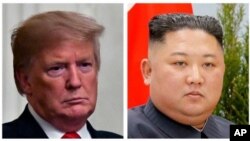If nuclear talks are to be successful, Washington and Pyongyang need to compromise their positions to agree on a shared definition and process of denuclearization, experts say.
"I believe that if both sides show flexibility and creativity that has been called for on the U.S. side, and if North Korea determines that the U.S. brings with it a new method of calculation, there is a possibility that there could be a deal," said Scott Snyder, a senior fellow for Korea studies at the Council on Foreign Relations. "But it won't be easy to close the gap between the two sides."
North Korea and the U.S. have agreed to resume long-stalled working-level talks this weekend in an effort to narrow their differences on denuclearization.
"I can confirm that U.S. and DPRK (Democratic People's Republic of Korea) officials plan to meet within the next week," U.S. State Department spokesperson Morgan Ortagus said Tuesday.
Earlier in the day, Choe Son Hui, North Korea's first vice foreign minister, announced the country agreed to resume talks with Washington on Saturday, preceded by a preliminary meeting Friday.
"It is my expectation that the working-level negotiations would accelerate the positive development of the DPRK-U.S. relations," Choe said through the country's state media Korea Central News Agency (KCNA).
Talks between the two sides have been stalled since the breakdown of the Hanoi Summit between U.S. President Donald Trump and North Korean leader Kim Jong Un in February.
At the summit, the two showed they were unwilling to narrow their differences over denuclearization and sanctions relief. Trump refused Kim's offer to dismantle a part of North Korea's nuclear facilities in exchange for sanctions relief, and asked for full denuclearization instead before the U.S. would lift any sanctions.
Kim promised that North Korea will return to the negotiating table when he met with Trump at the inter-Korean border in June.
But North Korea has conducted rounds of missile tests in the summer and dragged its feet to resume the talks until now.
The greatest obstacle the two sides need to overcome to achieve a breakthrough in negotiations is a shared understanding of denuclearization and an agreed process to get there, experts say.
Denuclearization
"The biggest sticking points are the absence of a commonly held definition of complete denuclearization and a failure to agree on practical steps and corresponding measures necessary to achieve that objective," Snyder said.
Evans Revere, a former State Department official who negotiated with North Korea, agrees.
"In an ideal world, [parties in] working-level talks would discuss and eventually agree upon a common definition of denuclearization, the steps that must be taken to achieve denuclearization, a timetable for denuclearization, and appropriate reciprocal steps that the United States would take as North Korea denuclearizes," said Revere. "That is what the United States should pursue in these talks."
The U.S. definition of denuclearization has been the elimination of North Korea's nuclear weapons programs. Washington has been demanding the country carry out the full dismantlement of its nuclear facilities, weapons and missiles.
North Korea, on the other hand, says that any deal involving North Korea giving up its nuclear arsenal must include the removal of the U.S. nuclear umbrella and military presence from the Korean Peninsula. It also demands that the U.S. halt its annual military exercises it holds with South Korea in the region.
These differences have put the two at odds with each other, hindering their ability to make a viable deal.
Concessions
Ken Gause, director of the analytics program at the CNA research group, said the two sides need to make concessions to move the process forward.
"It really comes down to getting that right balance of concessions on both sides to really get the talks moving," said Gause. "If one or the other side doesn't put enough on the table, I think these talks will fall apart fairly quickly."
Prior to their announcement for resuming the talks, Pyongyang had not made any new offers on denuclearization, and Washington has not shown indications it will relax sanctions.
North Korea, instead, has been pressuring the U.S. to change its position. In May, Pyongyang said Washington needs to come up with "a new method of calculation." Otherwise, it said, "the prospect for resolving the nuclear issue will be much gloomy."
Last week, Pyongyang told Trump to make a "bold decision" to produce a breakthrough in the deadlocked nuclear talks.
At the same time on Monday, it blamed the U.S. for stalled diplomacy and rising tensions on the Korean Peninsula.
"The situation on the Korean Peninsula has not come out of the vicious cycle of increased tension, which is entirely attributable to the political and military provocations perpetuated by the U.S.," said North Korean Ambassador Kim Song in his speech delivered to the United Nations General Assembly.
North Korea has been critical of joint military exercises the U.S. conducts with its ally South Korea, and cited the exercises the two countries held in August as its reason for launching multiple missiles this summer.
Secretary of State Mike Pompeo said earlier in September that the U.S. position on North Korea will remain the same.
Under these conditions, Gause said, North Korea will likely consider the talks as exploratory meetings to find out if the U.S. has changed its position and is willing to ease sanctions.
"In the long run, I don't think you're going to get anything out of the North unless you put some sanctions relief on the table," he said. "I think ultimately, talks will fall apart without sanctions relief."
Revere, however, does not think North Korea will agree to give up its nuclear weapons program under any circumstances.
"U.S.-DPRK dialogue to date has made it quite clear that Pyongyang has no intention of giving up its core nuclear weapons capabilities under almost any circumstances," he said. "What the United States seeks is something that North Korea is not prepared to do."








